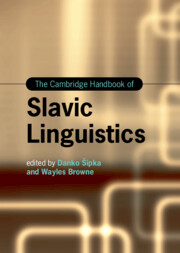Book contents
- The Cambridge Handbook of Slavic Linguistics
- Cambridge Handbooks in Language and Linguistics
- The Cambridge Handbook of Slavic Linguistics
- Copyright page
- Contents
- Figures
- Tables
- Contributors
- Introduction
- Part 1 Prosody and Phonology
- Part 2 Inflectional and Derivational Morphology
- Part 3 Syntax
- Part 4 Lexicon
- 23 The Structure of the Lexicon
- 24 Lexical Semantics
- 25 Lexical Borrowing
- Part 5 Sociolinguistic and Geographical Approaches
- Part 6 Experimental and Quantitative Approaches
- Name Index
- Subject Index
- References
25 - Lexical Borrowing
from Part 4 - Lexicon
Published online by Cambridge University Press: 16 May 2024
- The Cambridge Handbook of Slavic Linguistics
- Cambridge Handbooks in Language and Linguistics
- The Cambridge Handbook of Slavic Linguistics
- Copyright page
- Contents
- Figures
- Tables
- Contributors
- Introduction
- Part 1 Prosody and Phonology
- Part 2 Inflectional and Derivational Morphology
- Part 3 Syntax
- Part 4 Lexicon
- 23 The Structure of the Lexicon
- 24 Lexical Semantics
- 25 Lexical Borrowing
- Part 5 Sociolinguistic and Geographical Approaches
- Part 6 Experimental and Quantitative Approaches
- Name Index
- Subject Index
- References
Summary
Section 1 gives an operational definition of loanwords and exemplifies their categories. Section 2, on types of borrowing, distinguishes loanwords, which generally adapt to the recipient language’s system, from foreign words, which do not. There are one-source loanwords and hybrid loanwords (coming from two or more languages). Unlike one-language borrowing, chained borrowing passes through one or more intermediate languages. Borrowing via cultural influence and that due to geographical contacts are defined. Section 3 outlines main sources of borrowing: sources for Proto-Slavic, and sources for individual Slavic languages and their dialects. Section 4 outlines issues of phonological, morphosyntactic, semantic, and register/style adaptation. Section 5 discusses the lexical status of loanwords in Slavic; section 6, their sociolinguistic status. Purism dominated the lexicons of Slavic standard languages, especially those which had been under German-speaking rule. Section 7, on Slavic loanword research, focuses on ‘dictionaries of foreign words’, which are abundant and prominent in all Slavic cultures, while virtually unknown in English and other cultural traditions.
Keywords
- Type
- Chapter
- Information
- The Cambridge Handbook of Slavic Linguistics , pp. 545 - 556Publisher: Cambridge University PressPrint publication year: 2024



